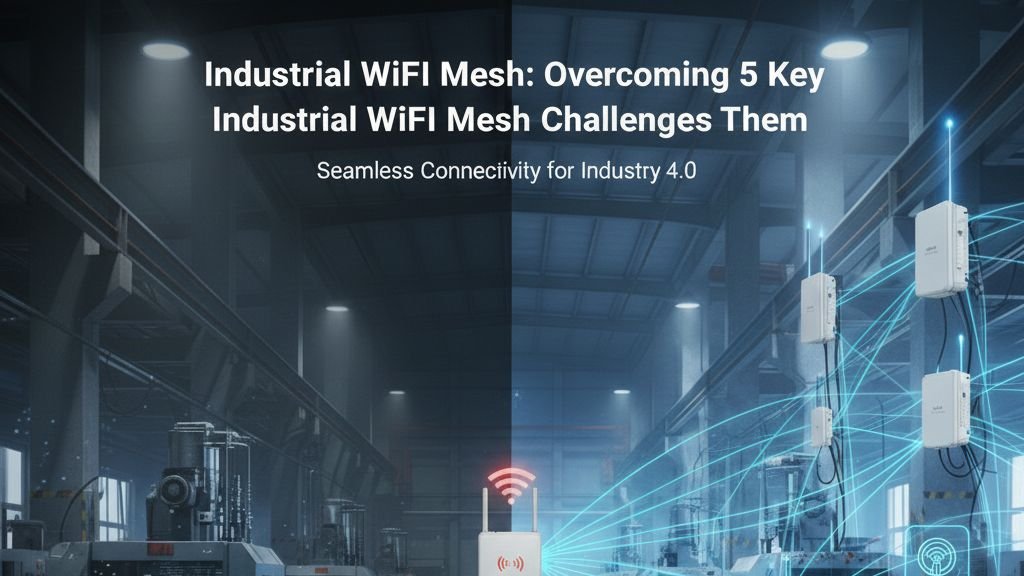In modern industries, seamless connectivity is no longer a luxury—it is the backbone of productivity, safety, and efficiency. From automated machines and IoT sensors to workforce communication and monitoring systems, everything depends on a reliable network. Yet, industrial environments present unique challenges that make traditional wireless setups difficult to manage. This is where an industrial WiFi mesh solution becomes the smarter choice.
Below, we’ll explore the top five challenges industrial facilities face and how mesh technology solves them.
1. Interference from Machinery and Infrastructure
The challenge:
Factories, warehouses, and mining sites are often filled with heavy machinery, thick walls, and metallic structures. These create serious signal interference that disrupts traditional WiFi, leading to frequent downtime and dead zones.
The solution with WiFi mesh:
An industrial WiFi mesh solution uses multiple interconnected nodes that automatically find the best path for data. If one signal path is blocked, the mesh reroutes traffic seamlessly, maintaining uninterrupted connectivity despite interference.
2. Large and Complex Coverage Areas
The challenge:
Industrial sites can span hundreds of thousands of square feet, with multiple floors, outdoor yards, or underground tunnels. A single access point or traditional point-to-point wireless system often fails to provide complete coverage.
The solution with WiFi mesh:
Mesh networks scale easily by adding more nodes wherever coverage is weak. This modular approach ensures reliable connectivity across the entire facility, no matter how large or complex the environment.
3. High Device Density and IoT Growth
The challenge:
With Industry 4.0, facilities rely on connected sensors, autonomous vehicles, smart cameras, and handheld devices—all demanding real-time communication. Legacy networks struggle under the load, causing slow speeds or dropped connections.
The solution with WiFi mesh:
An industrial WiFi mesh solution balances traffic intelligently across nodes, preventing overloads on a single access point. Mesh systems support high-density environments, enabling smooth operation for hundreds or even thousands of devices.
4. Reliability and Downtime Risks
The challenge:
In industries, even a few minutes of network downtime can halt production, delay shipments, or compromise worker safety. Traditional WiFi setups lack redundancy, making them vulnerable to single-point failures.
The solution with WiFi mesh:
Mesh networks are self-healing. If one node goes offline, data automatically reroutes through alternate paths. This ensures high uptime, keeping operations running smoothly and minimizing costly interruptions.
5. Harsh Environmental Conditions
The challenge:
Industrial environments often expose equipment to dust, vibrations, heat, cold, and moisture. Standard wireless gear may fail under these tough conditions, leading to frequent maintenance or replacements.
The solution with WiFi mesh:
Purpose-built industrial WiFi mesh solutions use ruggedized hardware designed to withstand extreme conditions. With durable enclosures, weatherproofing, and high-performance radios, they deliver reliable connectivity even in harsh environments.
Why Industrial WiFi Mesh Is the Future
By addressing interference, coverage gaps, device density, downtime, and environmental challenges, an industrial WiFi mesh solution empowers industries to embrace automation, IoT, and real-time data with confidence. Whether in manufacturing plants, warehouses, or mining operations, mesh technology ensures that connectivity is no longer a bottleneck but a driver of growth.
If your business is looking to modernize its network and stay ahead in Industry 4.0, investing in an industrial WiFi mesh solution is the smartest step forward.
FAQ
Q1. What is an industrial WiFi mesh solution?
An industrial WiFi mesh solution is a wireless network system that uses multiple interconnected nodes to provide seamless, reliable, and scalable connectivity across large and complex industrial environments.
Q2. How is industrial WiFi mesh different from traditional WiFi?
Unlike traditional WiFi that depends on a single access point, mesh networks distribute coverage through multiple nodes. This makes them more reliable, self-healing, and better suited for interference-heavy and large-scale industrial sites.
Q3. Can industrial WiFi mesh support IoT and automation systems?
Yes. Industrial WiFi mesh solutions are designed to handle high device density, making them ideal for IoT sensors, autonomous vehicles, smart cameras, and real-time automation processes in Industry 4.0.
Q4. Is an industrial WiFi mesh solution cost-effective for factories and warehouses?
Absolutely. While the initial setup may cost more than traditional systems, the scalability, reduced downtime, and lower maintenance costs make industrial WiFi mesh solutions highly cost-effective in the long run.
